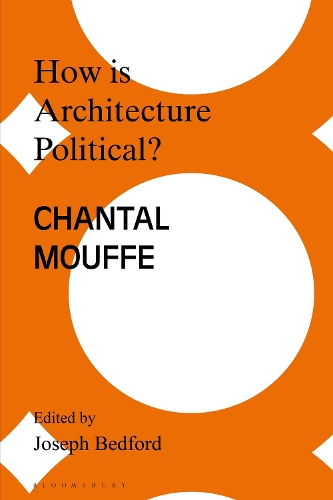
How is Architecture Political: Engaging Chantal Mouffe
(Hardback)
Available Formats
Publishing Details
How is Architecture Political: Engaging Chantal Mouffe
By (Author) Joseph Bedford
Bloomsbury Publishing PLC
Bloomsbury Academic
4th April 2024
United Kingdom
Classifications
Professional and Scholarly
Non Fiction
Theory of architecture
Social and political philosophy
Physical Properties
Hardback
192
Width 156mm, Height 234mm
Description
Chantal Mouffe has transformed the contemporary understanding of politics through her re-reading of political theory inspired by anti-foundationalist philosophybased on Saussures linguistics, Freuds psychoanalysis and Derridas deconstruction. Her writings have challenged the centrist, post-political ideology of the 1990s and presciently diagnosed the emergence of right-wing populism seen today with Trump and Brexit. For Mouffe, such populism is the result of the failed centrist conception of politics reduced to technical management. She has called for a return to politics on the view that social antagonisms cannot be reconciled but must be channeled into an agonistic form of institutionally stabilized struggle. This book brings Chantal Mouffes agonistic model of politics into direct dialogue with architecture and inquiries into the role that architecture plays constructing the political order of society, either by concealing or revealing its antagonisms and ideological conflicts. In doing so, it asks in what ways architecture operates politically; whether institutionally, in terms of its spaces and its part in forming cities, or as an aesthetic object with mediatic agency. Through this detailed exchange between Mouffe and four of the worlds leading architectural thinkers; Reinhold Martin, Ines Weisman, Pier Vittorio Aureli and Sarah Whiting, a debate unfolds within the book that tests the implications of Mouffes agonistic model of politics for architectural practice today. Through this, Bedford explores how architectural history, architectural drawing, the making of spectacular monuments, the design and policies behind housing, and the making of public and private space, all potentially contribute to the formulation of the channeling of social conflict into an agonistic form.
Author Bio
Joseph Bedford is Assistant Professor of History and Theory at Virginia Tech, USA. He holds a PhD from Princeton University, degrees from Cambridge University and the Cooper Union, and is the founding editor of Attention: The Audio Journal for Architecture and The Architecture Exchange, a platform for theoretical exchange in architecture. Chantal Mouffe is one of the worlds leading contemporary political theorists, and director of the Centre for the Study of Democracy at the University of Westminster. She has also held visiting positions at Harvard, Cornell, Princeton and the CNRS. She is the author of the seminal post-Marxist manifesto, Hegemony and Socialist Strategy, (1985) and recent books Agonistics: Thinking The World Politically (2013), On the Political (2005) and The Return of the Political (1993)
